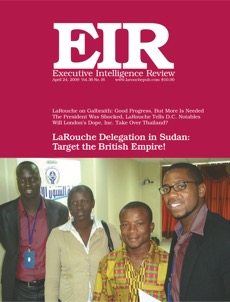LaRouche Delegation in Sudan: Target the British Empire!
by Lawrence K. Freeman
A four-person delegation from the LaRouche movement attended the World Conference for International Justice, Uniting Against the Politicization of Justice, in Khartoum on April 5-7.
Kick the British Out of Africa!
by Lawrence K. Freeman
His speech to the conference.
Sudan’s ‘TVA’: A Development Model for All of Africa
by Hussein Askary
Sudan is forging ahead with infrastructure development, the best answer to the British-run attacks against the nation.
Military Intervention Would Destroy Sudan
An interview with Abdel Budri.
Report from Darfur: Sudan Counters Effect of Foreign-Backed Rebellion
by Douglas DeGroot
Creativity & Economics
Comment on James Galbraith Paper: Good Progress, But More Is Needed
by Lyndon H. LaRouche, Jr.
Lyndon LaRouche takes off from a January 2009 paper by Prof. James K. Galbraith, “A Biophysical Approach to Production Theory.” Galbraith’s argument represents an important breakthrough, LaRouche writes, but it does not yet touch the more challenging domain: “What is actually human creativity?” While consistent with the currently accepted practice of Professor Galbraith’s profession, there is no possibility of understanding economic processes without keeping human creativity as the central focus of deliberation. “Therefore, as I shall emphasize here,” LaRouche writes, “the question addressed by economists ought to be: What is the experimentally validated meaning which should be assigned, by science, to the practical use of that universal term, ‘creativity’?”
World News
The President Was Shocked: An Opportunity To Bring This Planet Out of the Crisis
by Lyndon H. LaRouche, Jr.
Lyndon LaRouche’s opening remarks to a meeting of notables in Washington, D.C. on April 15, 2009.
Will London’s Royal Dope, Inc. Take Over Thailand?
by Michael Billington
British Target Obama in Drug-Legalization Bash
by Michael Billington
Arming Israel: U.S. Weapons Enforce British Mandate
by Carl Osgood
Soros’s ‘Twitter Revolution’: Twitter/Facebook: A Strategic Threat
by Matthew Ogden
International Intelligence
Economics
Ignore the Fascist ‘Happy Talk’; Fight for LaRouche’s Solutions!
by John Hoefle
The spin from the Obama Administration about “green shoots of recovery” bears all the hallmarks of the cult of “behavioral economists,” which has taken over aspects of the Administration’s economic policy.
What Is Their Secret? Degenerates Surround a Nero-Like President
by Tony Papert
More evidence that the “behavioral economists” are carriers of the virus of British fascism.
Chicago Boys Behind the White House Coup
by Anton Chaitkin
Public Health Emergency: Dire Shortage of U.S. Hospital Beds
by Marcia Merry Baker
OMB’s Orszag: ‘Reform’ Behavior To Cut Costs
by Carl Osgood
‘People Will Die’: Reality of Crash Is Hitting in California
by Harley Schlanger
Science & Technology
Infectious Disease Warning: Pandemic of Syphilis-Like Spirochete in U.S.A.
by Laurence Hecht
Lyme disease is an increasingly widespread illness that some within the Infectious Diseases Society of America tried to declare non-existent—and which many insurance companies refuse to cover. Yet, promising scientific leads point to a possible link to MS, Alzheimer’s disease, and other conditions.
Interviews
Abdel Budri
A Sudanese attorney who was jailed after Hassan al-Turabi seized power in 1989, Mr. Budri later managed to flee, and spent the next 18 years in exile. He returned to his native country in 2006, and is participating in the political process.
Book Reviews
Robotics as Post-Humanism
Wired for War: The Robotics Revolution and Conflict in the 21st Century, by P.W. Singer.
Editorial
There Is No Alternative!



